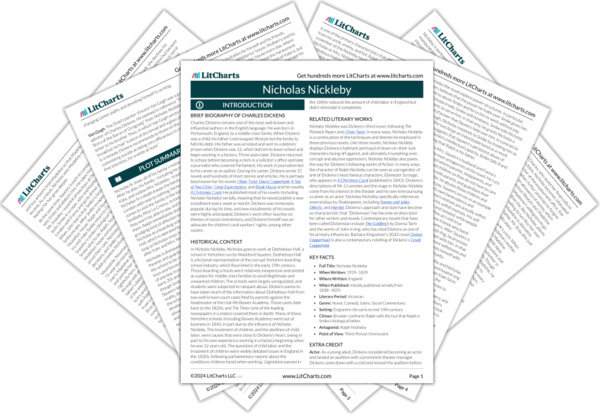Early in the novel, Ralph attends a parliamentary meeting in which people vote on a bill to bring a new company—called the United Metropolitan Improved Hot Muffin and Crumpet Baking and Punctual Delivery Company—into existence. Dickens makes it clear that Ralph, the politicians, and others in attendance want the business license to be granted because that decision will financially benefit them. However, when politicians make speeches about why the bill should be ratified, they claim that the muffin delivery business will help those who are vulnerable and downtrodden. They couch their support for the bill in terms of altruism and loudly broadcast that support by proclaiming the supposed moral worthiness of the business in question. Dickens shows, though, that those people loudly proclaim their good intentions to obscure their selfish motives. Dickens uses the mouthful of a business name (United Metropolitan Improved Hot Muffin and Crumpet Baking and Punctual Delivery Company) to underline the absurdity of the business and the irony of the politicians’ claims. Squeers uses similar tactics as the politicians. When trying to enlist students, Squeers promises parents that he will see to students’ well-being and mold them into responsible citizens. In truth, though, he only wants the parents’ money and will mistreat the students as soon as they arrive at Dotheboys Hall.
In contrast to Squeers, Ralph, and the politicians pushing for the United Metropolitan Improved Hot Muffin and Crumpet Baking and Punctual Delivery Company, the Cheeryble Brothers steadfastly devote themselves to helping others without calling attention to their altruistic actions. In fact, Charles and Ned pointedly avoid public praise for their virtuous acts. For example, Charles pledges a large sum of money to assist a widow whose husband has recently died. He then quickly changes the subject and moves the collector along to avoid calling attention to himself and taking credit for his generosity. The brothers’ relationship with Nicholas shows that that kind of behavior is common for the Cheeryble Brothers. Though they help Nicholas time and again, they avoid calling attention to or taking credit for their generosity. With that in mind, the novel suggests that loudly broadcasting one’s supposed benevolence is typically a sign of selfishness. In contrast, those who act out of genuine altruism avoid public praise or attention for their good deeds, which are rooted in a humble self-forgetfulness.
Altruism and Humility ThemeTracker

Altruism and Humility Quotes in Nicholas Nickleby
And after him, came the Scotch member, with various pleasant allusions to the probable amount of profits, which increased the good humour that the poetry had awakened; and all the speeches put together did exactly what they were intended to do, and established in the hearers' minds that there was no speculation so promising, or at the same time so praiseworthy, as the United Metropolitan Improved Hot Muffin and Crumpet Baking and Punctual Delivery Company.
My dear young Man.
I know the world. Your father did not, or he would not have done me a kindness when there was no hope of return. You do not, or you would not be bound on such a journey.
If ever you want a shelter in London (don't be angry at this, I once thought I never should), they know where I live, at the sign of the Crown, in Silver Street, Golden Square. It is at the corner of Silver Street and James Street, with a bar door both ways. You can come at night. Once, nobody was ashamed—never mind that. It's all over.
There was something so earnest and guileless in the way in which all this was said, and such a complete disregard of all conventional restraints and coldnesses, that Nicholas could not resist it. Among men who have any sound and sterling qualities, there is nothing so contagious as pure openness of heart. Nicholas took the infection instantly, and ran over the main points of his little history without reserve: merely suppressing names, and touching as lightly as possible upon his uncle's treatment of Kate. The old man listened with great attention, and when he had concluded, drew his arm eagerly through his own.











